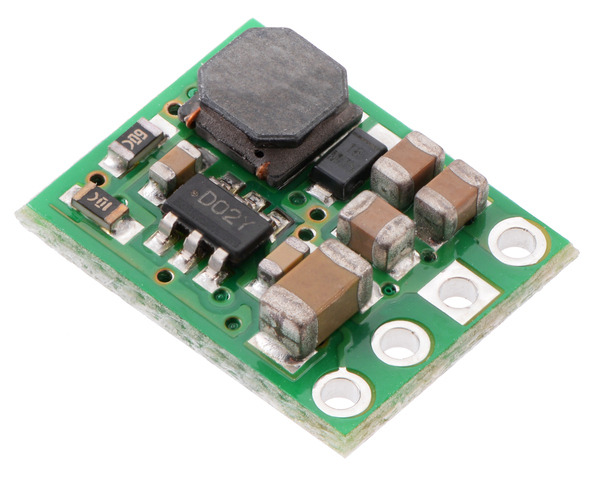Voltage Regulators and Power Supplies » Step-Down (Buck) Voltage Regulators » D36V6x Step-Down Voltage Regulators »
3.3V, 600mA Step-Down Voltage Regulator D36V6F3
| Output voltage | Typical max output current1 | Input voltage range2 |
|---|---|---|
| 3.3 V | 600 mA | 4 V – 50 V |
Note 1: Typical continuous output current at 36 V in. Actual achievable continuous output current is a function of input voltage and is limited by thermal dissipation. See the output current graphs on the product pages for more information.
Note 2: Minimum input voltage is subject to dropout voltage considerations; see the dropout voltage section of product pages for more information.
Alternatives available with variations in these parameter(s): output type Select variant…
 Compare all products in D36V6x Step-Down Voltage Regulators.
Compare all products in D36V6x Step-Down Voltage Regulators.
| Description | Specs (11) | Pictures (10) | Resources (3) | FAQs (0) | On the blog (1) | Distributors (37) |
|---|
Overview
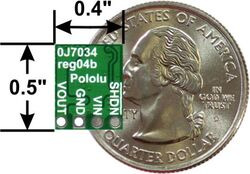 |
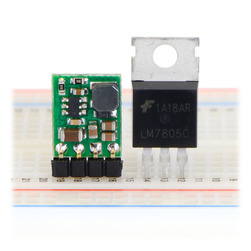 |
Pololu step-down voltage regulator D36V6Fx/D24V6Fx/D24V3Fx next to a 7805 voltage regulator in TO-220 package. |
|---|
The D36V6x family of buck (step-down) voltage regulators generates lower output voltages from input voltages as high as 50 V. They are switching regulators (also called switched-mode power supplies (SMPS) or DC-to-DC converters), which makes them much more efficient than linear voltage regulators, especially when the difference between the input and output voltage is large. This family includes seven versions with fixed output voltages ranging from 3.3 V to 15 V and two adjustable versions that can be set using a trimmer potentiometer:
- D36V6F3: Fixed 3.3V output
- D36V6F5: Fixed 5V output
- D36V6F6: Fixed 6V output
- D36V6F7: Fixed 7.5V output
- D36V6F9: Fixed 9V output
- D36V6F12: Fixed 12V output
- D36V6F15: Fixed 15V output
- D36V6ALV: Adjustable 2.5 – 7.5 V output
- D36V6AHV: Adjustable 4 – 25 V output
The regulators feature short-circuit/over-current protection, and thermal shutdown helps prevent damage from overheating. The boards do not have reverse-voltage protection.
Details for item #3791
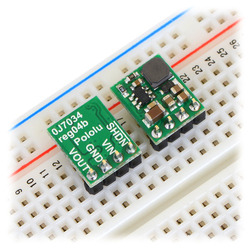 |
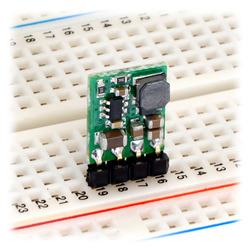 |
Features
- Input voltage: 4 V to 50 V (minimum input subject to dropout voltage considerations for currents over 400 mA; see the dropout voltage section for details)
- Output voltage: 3.3 V with 4% accuracy
- Maximum output current: 600 mA (see the maximum continuous output current graph below)
- Fixed 2.1 MHz switching frequency
- High-voltage enable input can put the board into a low-power state where it draws less than 2 μA (typical)
- Low quiescent current: < 0.1 mA (see the quiescent current graph below)
- Over-current and short-circuit protection, over-temperature shutoff
- Small size: 0.5″ × 0.4″ × 0.1″ (13 mm × 10 mm × 3 mm)
- Weight: 0.5 g
Connections
This regulator has four connections: shutdown (SHDN), input voltage (VIN), ground (GND), and output voltage (VOUT).
The SHDN pin can be driven low (under 1.25 V) to turn off the output and put the board into a low-power state (< 2 μA typical). The regulator is enabled by default, and this input can be left disconnected if you do not need this feature.
The input voltage, VIN, powers the regulator. Voltages between 4 V and 50 V can be applied to VIN, but for versions of the regulator that have an output voltage higher than 4 V, the effective lower limit of VIN is VOUT plus the regulator’s dropout voltage, which varies approximately linearly with the load (see below for graphs of the dropout voltage as a function of the load). Additionally, please be wary of destructive LC spikes (see below for more information).
The four connections are labeled on the back side of the PCB and are arranged with a 0.1″ spacing along the edge of the board for compatibility with solderless breadboards, connectors, and other prototyping arrangements that use a 0.1″ grid. You can solder wires directly to the board or solder in either the 4×1 straight male header strip or the 4×1 right-angle male header strip that is included.
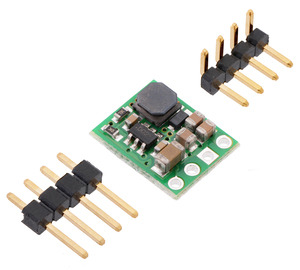 |
Typical efficiency
The efficiency of a voltage regulator, defined as (Power out)/(Power in), is an important measure of its performance, especially when battery life or heat are concerns.
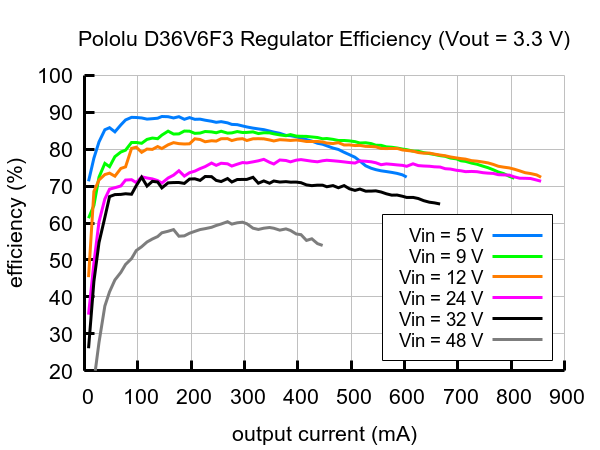 |
Maximum continuous output current
The maximum achievable output current of these regulators varies with the input voltage but also depends on other factors, including the ambient temperature, air flow, and heat sinking. The graph below shows maximum output currents that these regulators can deliver continuously at room temperature in still air and without additional heat sinking.
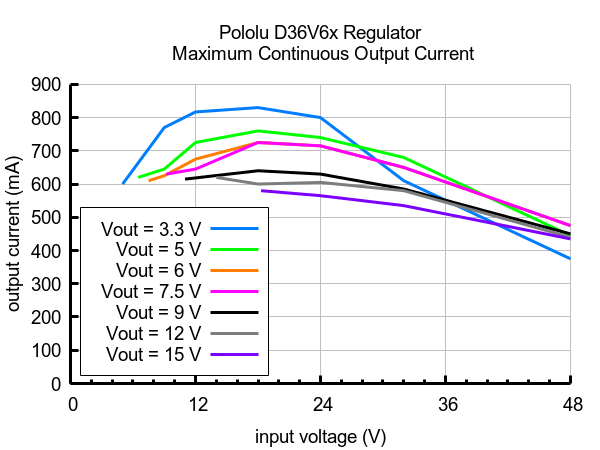 |
Quiescent current
The quiescent current is the current the regulator uses just to power itself, and the graph below shows this for the different regulator versions as a function of the input voltage. The module’s SHDN input can be driven low to put the board into a low-power state where it typically draws under 2 μA.
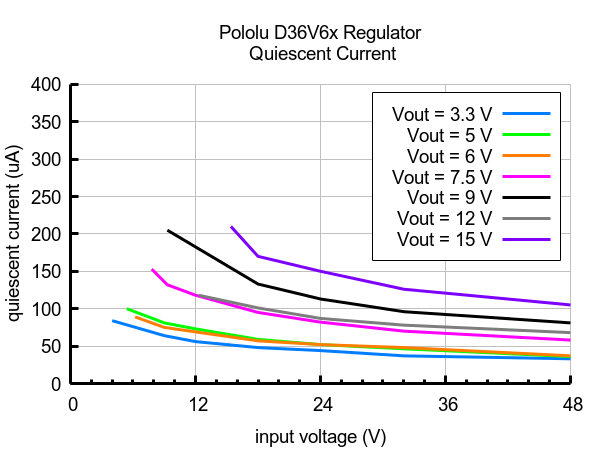 |
Typical dropout voltage
The dropout voltage of a step-down regulator is the minimum amount by which the input voltage must exceed the regulator’s target output voltage in order to ensure the target output can be achieved. For example, if a 5 V regulator has a 1 V dropout voltage, the input must be at least 6 V to ensure the output is the full 5 V. Generally speaking, the dropout voltage increases as the output current increases. The graph below shows the dropout voltages for the different members of this regulator family:
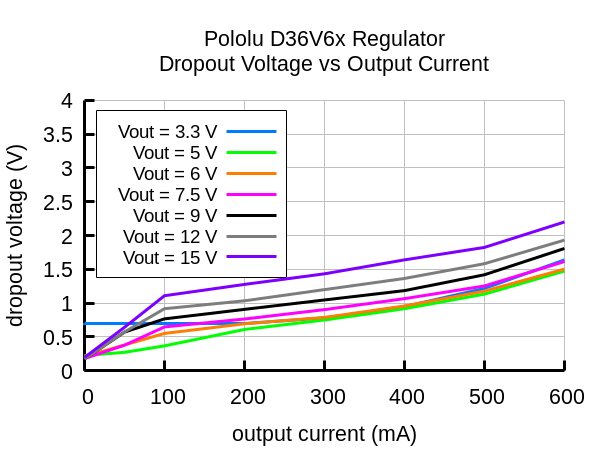 |
LC voltage spikes
When connecting voltage to electronic circuits, the initial rush of current can cause voltage spikes that are much higher than the input voltage. If these spikes exceed the regulator’s maximum voltage (50 V), the regulator can be destroyed. In our tests with typical power leads (~30″ test clips), input voltages above 28 V caused spikes over 50 V.
If you are connecting more than 28 V or your power leads or supply has high inductance, we recommend soldering a suitably rated 33 μF or larger electrolytic capacitor close to the regulator between VIN and GND.
More information about LC spikes can be found in our application note, Understanding Destructive LC Voltage Spikes.
People often buy this product together with:
 |
5V, 600mA Step-Down Voltage Regulator D36V6F5 |
 |
2.5-7.5V Adjustable Step-down Voltage Regulator D36V6ALV |
 |
4-25V Adjustable Step-down Voltage Regulator D36V6AHV |
